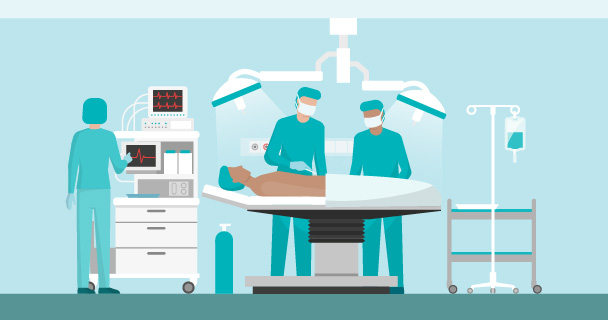






5 Reasons Why Lifelong Learning is Essential in Healthcare

Trisha Coady, VP, Clinical Staff Development at HealthStream, recently offered the following points about the importance of lifelong learning in healthcare.
1. Healthcare is becoming ever more challenging in its complexity.
The nature of professional healthcare learning, which has become "more challenging than ever… because of the plethora of published literature and electronic information that exists, combined with the fact that new knowledge is emerging at an accelerating pace. Upon entering practice, the health care professional experiences increased demands that reduce the time available for learning and assessment, and over time the professional's knowledge of emerging evidence-based practice and professional competence may deteriorate" (ACICBL, 2011).
2. Patients and their families have expectations for the highest possible quality care.
Johns Hopkins Nursing shares that some of the impetus comes from patients and their families, who are "no longer quiescent [and] now demand answers from the nurses who provide their care" (Edelson, 2012). People are more likely than ever to educate themselves about their healthcare conditions and treatments and expect their care professionals to know even more in order to help them.
3. Healthcare leadership requires knowledge and competency in staff like never before.
Lifelong learning is a vital component of the commitment to be an effective leader, and as Edward Lamb, Chairman of the American College of Healthcare Executives (ACHE) puts it, "To engage fully in professional and leadership development activities, healthcare executives should commit to participating in educational offerings that develop a balance of healthcare management competencies and an evolving set of people skills" (Lamb, 2016). An ACHE-sponsored survey of healthcare CEOs showed that they "mostly value continuing education to understand changes (81%), keep themselves abreast of current trends (74%), to solve problems (62%), and to learn about new technology (60%)" (Walston and Khaliq, 2010).
4. Healthcare employee disengagement is poor, and lifelong learning is one solution.
Also, engagement of most healthcare professionals is lower than the average US workforce, with turnover costing billions of dollars annually in an environment with significant margin pressure. Nearly one in four nurses (24%) are currently actively disengaged, compared to only 16% of the U.S. working population (http://www.gallup.com/poll/6004/nurses-may-satisfied-they-engaged.aspx). Deploying creative opportunities for new or reinforced learning, as well as motivating creativity among staff has never been more paramount.
Establishing and nurturing a culture of lifelong learning inherently promotes employee engagement. "Using standardized mortality and complication indexes, from more than 200 hospitals and including staffing and other variables such as nurse engagement, showed a significant relationship between engagement and outcomes," (Blizzard, 2005).
5. Lifelong learning is a mandatory career advancement requirement.
If we reflect on our own career progression, there are decisions we make after 20 years of experience that are drastically different than what we would have made in our first year out of college. To amass that experience and level of critical thinking, we've likely pursued formal education or courseware, attended conferences, volunteered on committees, leveraged peers and mentors, etc. Did your own manager force all of these activities upon you or did you seek these out? If the opportunity was presented to you, were you more likely to participate? My guess is that most have an intrinsic desire to seek some level of learning and certainly are more likely to participate if opportunities are presented. There will always be a need for mandatory, regulatory or focused training through a learning management system, but I also believe it's just as critical to offer opportunities for self-development.
Contact HealthStream to speak to a solutions expert learn more about our courses related to Nursing Training.
References:
Blizzard, Rick, D.B.A., "Nurse Engagement Key to Reducing Medical Errors," Gallup.com, December 27, 2005, accessed at http://www.gallup.com/poll/20629/nurse-engagement-key-reducing-medical-errors.aspx.
Edelson, Mat, "Lifelong Learning," Johns Hopkins Nursing, November 29, 2012, accessed at http://magazine.nursing.jhu.edu/2012/11/lifelong-learning/.
Institute of Medicine (US) Committee on the Robert Wood Johnson Foundation Initiative on the Future of Nursing, at the Institute of Medicine, "The Future of Nursing: Leading Change, Advancing Health," National Academies Press (US); 2011.
Josiah Macy Foundation, American Association of Colleges of Nursing (AACN) and the Association of American Medical Colleges (AAMC), "Lifelong Learning in Medicine and Nursing Final Conference Report, " 2010.
Lamb, Edward, "Executives must commit to lifelong learning in relentless pursuit of quality improvement," Modern Healthcare, March 12, 2016, accessed at http://www.modernhealthcare.com/article/20160312/MAGAZINE/303129978.
Walston, Stephen L., PhD, and Amir A Khaliq, PhD, "The Importance and Use of Continuing Education: Findings of a National Survey of Hospital Executives," The Journal of Health Administration Education, Spring 2010. 8
